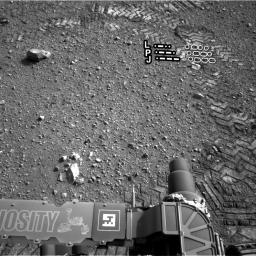
|
Reading the Rover’s Tracks
- Click the image above for a larger view
- Full-Res JPEG (1024 x 1024) (274.3 kB)
- Full-Res TIFF (1024 x 1024) (1.1 MB)
Caption:
The straight lines in Curiosity's zigzag track marks are Morse code for JPL, which is short for NASA's Jet Propulsion Laboratory in Pasadena, Calif., where the rover was built and the mission is managed. The "footprint" is more than an homage to the rover's builders, however. It is an important reference mark that the rover can use to drive more precisely via a system called visual odometry.
The Morse code, imprinted on all six wheels, is: .--- (J), .--. (P), and .-.. (L), as indicated in this image.
Background Info:
JPL manages the Mars Science Laboratory/Curiosity for NASA's Science Mission Directorate in Washington. The rover was designed, developed and assembled at JPL, a division of the California Institute of Technology in Pasadena.
For more about NASA's Curiosity mission, visit: http://www.jpl.nasa.gov/msl , http://www.nasa.gov/mars , and http://marsprogram.jpl.nasa.gov/msl .
Cataloging Keywords:
| Name | Value | Additional Values |
|---|---|---|
| Target | Mars | |
| System | ||
| Target Type | Planet | |
| Mission | Mars Science Laboratory (MSL) | |
| Instrument Host | Curiosity Rover | |
| Host Type | Rover | |
| Instrument | ||
| Detector | ||
| Extra Keywords | Grayscale | |
| Acquisition Date | ||
| Release Date | 2012-08-29 | |
| Date in Caption | ||
| Image Credit | NASA/JPL-Caltech | |
| Source | photojournal.jpl.nasa.gov/catalog/PIA16111 | |
| Identifier | PIA16111 | |
